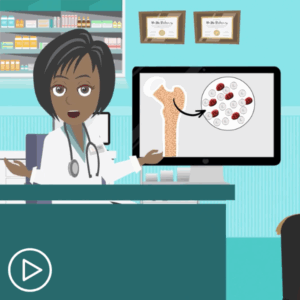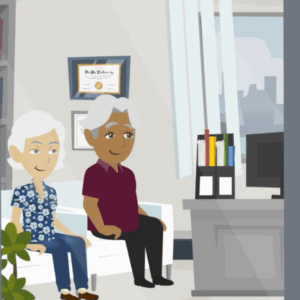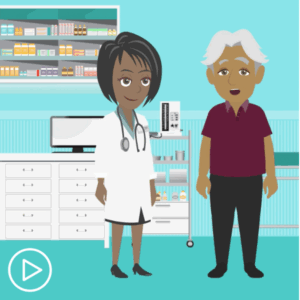What is the role of a chronic lymphocytic leukemia (CLL) care partner? This animated video explains how care partners can support their loved one and shares advice for maintaining their own self-care and wellness.
Related Resources
Transcript
Joseph:
Hi! I’m Joseph. Welcome back to the CLL Collaborate video series.
In this video, I have a special guest here with me—my daughter, Amy. Thanks for joining us!
Amy:
I’m glad I could be here!
The loved ones of people living with CLL help in many ways. From scheduling appointments to being a source of emotional support, we’re right here alongside the patient as decisions about care are discussed and made.
So, the goal of this video is to share advice for self-care and to help care partners understand their important role.
Joseph:
Amy, as I know well, care partners like you are essential. Who can a care partner be exactly?
Amy:
A care partner can be any trusted person who supports a patient in their care, such as a friend, family member or an adult child, like me.
Joseph:
You have been a huge help in picking up the daily tasks that I sometimes felt overwhelmed by —like grocery shopping and preparing meals. What other tasks could care partners take on?
Amy:
I’d like to start by saying that learning more about CLL, through the healthcare team and patient education sources, like the Patient Empowerment Network, is key. Information is power, so educating yourself about CLL can help care partners confidently discuss options and collaborate on care decisions.
- This is important because care partners can join doctor visits to ask questions and to take notes to review and reference later.
- Care partners can also keep track of appointments and help their loved one stay on their treatment schedule. This is useful because some of the newer CLL treatments are pills that may be taken at home.
- Communicating with family members, friends and the healthcare team is another critical role—responding to concerns from others can be taxing on the patient.
- And, the care partner may also serve as an advocate for the patient when they aren’t able to speak up and do it themselves.
- Next, care partners can keep an eye out for any changes in the patient’s health and let the doctor know if something seems wrong.
- Finally, care partners are an important source of emotional support. This can include paying attention to their mental health or even just listening when their loved one needs to talk.
Joseph:
I especially needed this during the watch-and-wait period—I felt anxious about having CLL and not treating it right away. You were so supportive.
Amy:
I could tell you were stressed! We talked it out and then found a counselor who could assist you through that time. And, of course, learning about the purpose of watch and wait helped make it less scary.
Joseph:
Because care partners spend a lot of time with the patient, they can notice small changes that others may not—maybe even before the patient notices a shift themselves.
But, Amy, when a care partner is supporting their loved one, sometimes their own health can be pushed aside. I know that you put off a few of your own doctor visits when my care was demanding.
Do you have any self-care advice for care partners?
Amy:
- Well, as you mentioned, we should start with the importance of prioritizing your OWN health. Make sure to schedule and KEEP appointments. Remember, keeping yourself healthy is vital to being able to continue to be a good care partner.
- You should ensure that you are taking breaks, whether that’s exercise, a hobby, or just a short time away for yourself. For example, if a daily walk brings you joy, make time in your schedule to squeeze it in—even if it is only a few minutes a day.
- Manage stress and maintain a healthy lifestyle. Prioritizing sleep, exercise and eating well will pay off in many ways.
- And, take people up on their offers to help. Be ready to give them tasks when they ask what they can take off your plate. Remember, others want to help!
- Finally talk it out with a friend, support group or counselor. Joining a support group for care partners made me feel less alone, and I learned about several useful resources there.
Joseph:
Thank you, Amy! You can also find care partner resources through advocacy groups like the American Cancer Society and Cancer Support Community. Download the guide that goes with this video for links to these organizations and to review what we covered in this video.
Amy:
Visit powerfulpatients.org/CLL to access more CLL information. Thanks for joining us!



